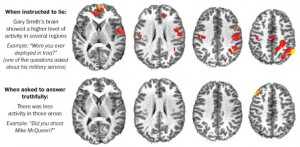 “We discovered that fine-grained patterns of neural activity within the orbitofrontal cortex, an area of the brain associated with emotional processing, act as a neural code which captures an individual’s subjective feeling,”
“We discovered that fine-grained patterns of neural activity within the orbitofrontal cortex, an area of the brain associated with emotional processing, act as a neural code which captures an individual’s subjective feeling,”
purported Adam Anderson, associate professor of human development in Cornell University’s College of Human Ecology and senior author of the study, “Population coding of affect across stimuli, modalities and individuals,” which was published online June 22 in Nature Neuroscience.
This STUDY noted that even though feelings are subjective, our brains turn our emotions into a standard code that objectively represents emotions across different senses, situations and even people
Researchers presented 16 participants with a series of images and tastes and analyzed their brains responses to these subjective experiences via functional neuroimaging. This specialized neuroimaging technology, representational similarity analysis, is able to analyze a the spatial patterns of a person’s brain activity across populations of neurons rather than the traditional approach of assessing activation magnitude in specialized regions.
“It appears that the human brain generates a special code for the entire valence spectrum of pleasant-to-unpleasant, good-to-bad feelings, which can be read like a ‘neural valence meter’ in which the leaning of a population of neurons in one direction equals positive feeling and the leaning in the other direction equals negative feeling,” Anderson explains.
The study was atypically small, but the authors noted that the representation of our internal subjective experience is not confined to specialized emotional centers.
The findings showed that similar subjective feelings – whether evoked from the eye or tongue – resulted in a similar pattern of activity in the OFC, suggesting the brain contains an emotion code common across distinct experiences of pleasure (or displeasure), they say. Furthermore, these OFC activity patterns of positive and negative experiences were partly shared across people.
“Despite how personal our feelings feel, the evidence suggests our brains use a standard code to speak the same emotional language,” Anderson concluded.
 It’s almost August and football season is right around the corner. All across the country football coaches from Pee Wee leagues up through the NFL are exhorting players to push themselves to be the best they can be. Many will go through grueling workouts; some enduring “two-a-days” and a familiar cry from coaches will be “No pain, no gain!”I remember my high school football coach repeating that phrase many times during my three years of varsity football. The meaning was simple – sacrifice now and reap the rewards later. Lifting weights, running wind sprints, repeating drills, and long practices in the hot summer sun would all be worth it when we achieved victory on Friday nights under the lights in front of our parents, friends and community. In persuasion, “no pain, no gain” has a different meaning but can lead to success just as is did on the gridiron. When trying to influence others it’s good to know this simple concept – people are more motivated by what they stand to lose (pain) versus what they might gain. This is a form of scarcity. The late Amos Tversky, a cognitive and mathematical psychologist, and Daniel Kahneman, a psychologist, studied this phenomenon of human behavior. In fact, Kahneman won the noble prize for his work in this area in 2002.Here’s what Tversky and Kahneman learned – people experience the pain of loss anywhere from 2.0-2.5 times more than the joy of gaining the same thing. So imagine you find $100 bill on the way to your car after work. You’re elated! You drive home with a broad smile, feeling great about your good fortune. You pull into the driveway and walk into your home with extra spring in your step. As soon as you see someone you begin to tell him or her about your good fortune. You reach into your pocket to pull out the big bill…and it’s gone! How do you feel at that moment? Odds are you feel much worse than however good you felt when you found it. And here’s your litmus test; you left the house in a good mood without a $100 bill, got home without the $100 bill, but now you feel bad…really bad!Why is this important to know? Sometimes you have a choice about how you’ll frame a request – highlight the gain or highlight the loss – and that small decision could be the difference between a “Yes!” or “No!” quite often.In one study of homeowners by the University of California, people were given energy saving ideas. One group was told if they implemented the recommendations they would save an average of $180 on their electric bill over the next 12 months. Another group was told they would lose $180 during the next 12 months if they didn’t adopt the recommendations because they would overpay on their electric bill.It’s the same $180 but when the group that was told they would lose heard this, 150% more decided to implement the energy saving recommendations. That’s a pretty significant difference just by changing the way information was presented. It costs no more to say it either way but the end result was huge.What does this mean for you? Next time you present to someone think about how you might highlight potential loss instead of what someone might gain. For example, if you’re in financial services encouraging someone to save a bit more could make a huge difference in their retirement.Gain Approach – Bob, if you can find a way to set aside 1% more of your income that could mean an additional $250,000 by the time you retire.Loss Approach – Bob, if you can’t find a way to set aside 1% more of your income that could mean losing $250,000 by the time you retire!The financial rep employing the loss approach will be more successful over the long run and clients will appreciate the advice when they hit retirement because they’ll have much more in their bank accounts.I’m not encouraging you to be a negative Nellie but I am encouraging you to use language that scientific research has proven will be more effective in helping you hear “Yes!” That’s what this blog is all about – making small changes in your persuasion approach with people in order to generate big differences.
It’s almost August and football season is right around the corner. All across the country football coaches from Pee Wee leagues up through the NFL are exhorting players to push themselves to be the best they can be. Many will go through grueling workouts; some enduring “two-a-days” and a familiar cry from coaches will be “No pain, no gain!”I remember my high school football coach repeating that phrase many times during my three years of varsity football. The meaning was simple – sacrifice now and reap the rewards later. Lifting weights, running wind sprints, repeating drills, and long practices in the hot summer sun would all be worth it when we achieved victory on Friday nights under the lights in front of our parents, friends and community. In persuasion, “no pain, no gain” has a different meaning but can lead to success just as is did on the gridiron. When trying to influence others it’s good to know this simple concept – people are more motivated by what they stand to lose (pain) versus what they might gain. This is a form of scarcity. The late Amos Tversky, a cognitive and mathematical psychologist, and Daniel Kahneman, a psychologist, studied this phenomenon of human behavior. In fact, Kahneman won the noble prize for his work in this area in 2002.Here’s what Tversky and Kahneman learned – people experience the pain of loss anywhere from 2.0-2.5 times more than the joy of gaining the same thing. So imagine you find $100 bill on the way to your car after work. You’re elated! You drive home with a broad smile, feeling great about your good fortune. You pull into the driveway and walk into your home with extra spring in your step. As soon as you see someone you begin to tell him or her about your good fortune. You reach into your pocket to pull out the big bill…and it’s gone! How do you feel at that moment? Odds are you feel much worse than however good you felt when you found it. And here’s your litmus test; you left the house in a good mood without a $100 bill, got home without the $100 bill, but now you feel bad…really bad!Why is this important to know? Sometimes you have a choice about how you’ll frame a request – highlight the gain or highlight the loss – and that small decision could be the difference between a “Yes!” or “No!” quite often.In one study of homeowners by the University of California, people were given energy saving ideas. One group was told if they implemented the recommendations they would save an average of $180 on their electric bill over the next 12 months. Another group was told they would lose $180 during the next 12 months if they didn’t adopt the recommendations because they would overpay on their electric bill.It’s the same $180 but when the group that was told they would lose heard this, 150% more decided to implement the energy saving recommendations. That’s a pretty significant difference just by changing the way information was presented. It costs no more to say it either way but the end result was huge.What does this mean for you? Next time you present to someone think about how you might highlight potential loss instead of what someone might gain. For example, if you’re in financial services encouraging someone to save a bit more could make a huge difference in their retirement.Gain Approach – Bob, if you can find a way to set aside 1% more of your income that could mean an additional $250,000 by the time you retire.Loss Approach – Bob, if you can’t find a way to set aside 1% more of your income that could mean losing $250,000 by the time you retire!The financial rep employing the loss approach will be more successful over the long run and clients will appreciate the advice when they hit retirement because they’ll have much more in their bank accounts.I’m not encouraging you to be a negative Nellie but I am encouraging you to use language that scientific research has proven will be more effective in helping you hear “Yes!” That’s what this blog is all about – making small changes in your persuasion approach with people in order to generate big differences.